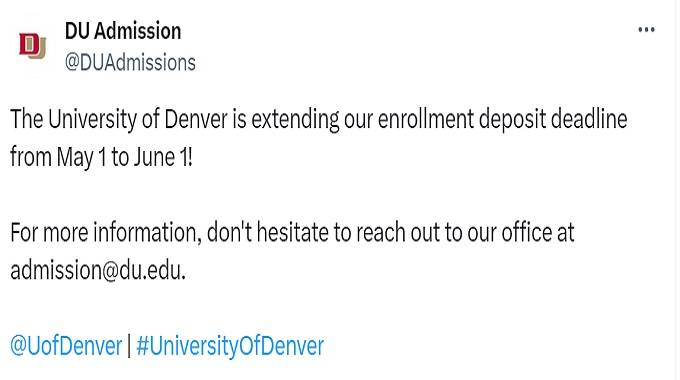Study abroad: University of Denver extends enrollment deposit deadline to June 1
The enrollment deposit deadline has been extended to June 1 for admitted first-year students starting in fall 2024.
The University of Denver has extended the enrollment deposit deadline from May 1 to June 1, 2024.
"The University of Denver is extending our enrollment deposit deadline from May 1 to June 1! For more information, don't hesitate to reach out to our office at admission@du.edu," reads the message by the University of Denver on X platform.
The university has two important application deadlines: November 1 for Early Decision I and Early Action; and January 15 for Early Decision II and Regular Decision. Early Action and Regular Decision are both non-binding applications; students who apply during Early Action or Regular Decision rounds of admission will have until June 1 to make their decision about attending DU as the university has extended the enrollment deposit deadline to June 1 for admitted first-year students starting in fall 2024. Students admitted during Early Decision rounds of admission receive an additional $5,000 merit scholarship and top academic performers will have their full demonstrated financial need met.
According to the university's statement, the Early Decision applicants enjoy stronger consideration for admission and benefit from earlier admission and financial aid notifications.
Financial Aid & Scholarships
Once you complete your application for admission to the University of Denver, you will be automatically considered for merit scholarships. These grants and scholarships are awarded based on the student's academic achievement record and the strength of the application. The university offers over $170 million in financial aid to undergraduates each year.
The university emphasises a passion for diverse learning. For admission, they consider grades and coursework but are also interested in less quantifiable parts of your application such as taking new challenges outside the classroom and contributing to schools and the community.
Academic performance in high school is the most important factor in the admission process. The university is a test-optional university, and submitting test scores is the student's choice.
If the student chooses to submit the SAT and/or ACT scores, they will be considered along with other application materials for both admission and merit scholarships.
The University of Denver will accept either the SAT or the ACT. SAT Code: 4842 and ACT Code: 0534.
DU do not consider subject tests or writing sections. If you’ve taken either test more than once, the university will combine the best scores from the individual sections of each test to create an ideal “super score.”
If you are a student attending a non-graded high school that does not provide a letter or numerical grade, you can be considered for admission without submitting an official SAT or ACT. However, in order to be considered for merit scholarships, you will need to submit an official SAT or ACT score.
Read more:
The Alabama University application fee for International students vary by application type. Mentioned below are the application fee for UG and PG applications at Alabama:
- UG: USD 40 or INR 3,342.14
- MBA: USD 80 or INR 6,684.28
International students must have at least a GPA between 2.5 and 3.0 on a scale of 4.0 for UG and PG admission at Oregon State. Therefore, candidates are eligible to get admission to the university with a 3.5 GPA in their academics. Oregon State University GPA requirements are different for undergraduate and graduate admission. Mentioned below is the range of GPA required for Oregon State University admissions:
| Program | Minimum GPA Required (on a scale of 4.0) |
|---|---|
| Undergraduate | 2.5 - 3.0 |
| Graduate | 2.5 - 3.0 |
Read about the Grading System in the USA
Pick your stage and get free guidance from counsellors who've helped thousands get into top universities.
 Starting research
Starting research Shortlisting colleges
Shortlisting colleges Exam preparation
Exam preparation SOP/LOR writing
SOP/LOR writing Scholarship & finance
Scholarship & finance Visa application
Visa application



The university offers a top-notch environment, the best academic opportunities, technical & career training, etc. The university boasts over 1000 international students who represent more than 95 countries. Additionally, international students highly enjoy the facilities provided by the University of North Dakota. The UND is one of the largest research universities in the United States for international students.